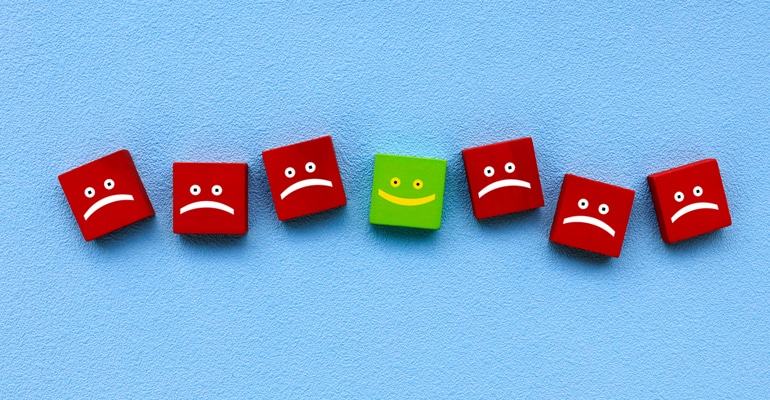Have you considered that your closely held beliefs about your worth — the ones that send you spiraling into negativity — may not be true? Here’s advice from Jamie Spannhake on challenging and changing your core beliefs.

Table of contents
- What You Believe Is True — Even When It’s Not
- Recognizing and Changing Your Negative Core Beliefs
- 1. Start by Recognizing Your Thoughts
- 2. Analyze Your Thoughts to Discover Your Underlying Beliefs
- 3. Now, Challenge Those Beliefs and Thoughts
- 4. Experiment With a Different Belief
- 5. Keep Trying to Show Yourself Compassion to Combat Negative Self Talk
- Background on Core Beliefs
- Overcoming Obstacles and Setbacks
What You Believe Is True — Even When It’s Not
Our beliefs about ourselves and the world make up our core beliefs. They are assumptions we make. But they may not be facts. In other words, just because you believe it to be true doesn’t mean it is.
The definition of assumption is “a thing that is accepted as true or certain to happen, without proof.” You might think that lawyers, of all people, would be better about not making assumptions. We know the deal isn’t done until the papers are signed, and the money arrives in the bank. We are familiar with the adage, “If you can’t prove it in court, then it doesn’t win the case.” We want facts. We want proof.
Yet lawyers rely on core beliefs — assumptions — just as much as the next person. Because we can’t help it and may not even know we are doing it. I mean, if you just “know” something to be true, you don’t question whether it’s true.
And therein lies the problem.
Sometimes those core beliefs are the very things that hold you back or make life more difficult than it has to be. But we all have some ability to change that by recognizing — and possibly changing — our core beliefs. This is where core belief work comes in, utilizing therapeutic techniques aimed at uncovering and reshaping fundamental beliefs.
Recognizing and Changing Your Negative Core Beliefs
Psychologists will tell you that changing your core beliefs is a tall order, but that doesn’t mean you can’t try. Just because a journey is long doesn’t mean you don’t start it. In fact, because the journey is long, it’s best to start sooner rather than later.
Here are five ways to start recognizing, challenging and changing core beliefs that aren’t serving you.
1. Start by Recognizing Your Thoughts
One of the best ways to do this is through mindfulness. And one of the best ways to cultivate mindfulness is through meditation. Meditation helps improve your ability to have a moment in the moment to turn your attention to what you are thinking and feeling. It allows you to be more objective about what is happening and how you are reacting.
If you have a meditation practice already, you have seen these benefits. If you had a practice in the past, commit to starting it again. And if you’ve never tried meditation, it’s easy to start.
I like to share a quick two-minute meditation with coaching clients:
Focus on your breath while sitting comfortably, then count one for your in-breath, two for out-breath, and so on, until you get to 10. Then count back down from 10 to one with your breath. It’s a quick, easy way to reset and start developing a meditation practice.
Or, if you prefer guided meditations, YouTube and InSight Timer have free guided meditations, as does Tara Brach, who offers many free meditation courses and sessions.
2. Analyze Your Thoughts to Discover Your Underlying Beliefs
Once you’ve recognized your thoughts, take time to consider the negative beliefs that underlie those thoughts. Identifying and challenging these negative beliefs is significant for personal development and psychological well-being. This may be a good place to start working with a therapist because some core beliefs protect you from emotions you don’t want to experience. Also, a skilled therapist can help you process those emotions safely and productively, especially if you’ve experienced trauma.
One way to analyze thoughts and discover your underlying beliefs is to “go down the rabbit hole” of what it means if your thought is, in fact, true. When you ask what it means when you think “I need to do more at work,” your next thought might be that you don’t do enough or you’re not successful enough. And the thought that follows could be “I’m not enough.” BAM! That’s your underlying core belief, and it’s not helping you live your best life.
3. Now, Challenge Those Beliefs and Thoughts
You don’t need to look for evidence that your core beliefs are true. You are already very familiar with all those things you think are facts. So, like any good lawyer, look for evidence that what you think and believe is not true. For example, is it really true that you always mess things up? Is there evidence to the contrary? What about the success you’ve had in the past that you’ve suddenly forgotten or diminish as not important?
Regularly using the words “always” and “never” is a signal that you may be overlooking evidence that challenges your negative core beliefs. This kind of black-and-white thinking is often a clear sign that your perspective may not be based in fact.
4. Experiment With a Different Belief
It may seem impossible if you’ve had a core belief for as long as you can remember, but you can experiment with adopting and reinforcing new beliefs and ideas different from your usual ones. In the beginning, this will feel fake. It is, after all, contrary to what you’ve seen as truth for a long time. But give it a try. There’s nothing to lose.
If you feel like you’re “never” good enough, spend an hour one day acting as if you are good enough for that one hour. You may find that the new belief is just as plausible as your old negative belief. Again, if you struggle to break out of patterns, a coach or therapist can help you recognize and challenge those thoughts.
5. Keep Trying to Show Yourself Compassion to Combat Negative Self Talk
Any change is hard, and changing a core belief can be very difficult, often leading to feelings of self-doubt. All you can do is try and keep trying. Showing yourself compassion will help you as you journey down the path to a better perspective and a better life.
Background on Core Beliefs

What Are Core Beliefs?
Core beliefs are the underlying assumptions we make about ourselves, others and the world. They are formed in childhood and adolescence and are influenced by our experiences, environment and relationships. They are the lens through which we view ourselves and the world. While core beliefs can be positive, negative core beliefs can really hold us back from being our best selves.
Imagine carrying a heavy backpack full of negative core beliefs like “I’m not good enough” or “I don’t deserve happiness”. These deep seated beliefs weigh us down and affect our self esteem and overall wellbeing. Recognizing and addressing these negative core beliefs is key to personal growth and mental health.
How Do Core Beliefs Form?
Core beliefs form from a combination of our experiences, environment and relationships. In our formative years we absorb information from our surroundings and that shapes our core beliefs. For example if a child is constantly criticised or belittled by caregivers they may form a negative core belief that they are not good enough. If a child experiences trauma or abuse they may form the belief that the world is a dangerous place.
These beliefs become the foundation of our thought patterns and behavior. Knowing how core beliefs form helps us to identify the root of our negative thinking and where to start to change.
Negative core beliefs can take many forms but some common ones are:
- I am not good enough
- I am unlovable
- I am a failure
- I am not worthy of love and respect
- I am not capable of achieving my goals
- I am not deserving of happiness
These negative core beliefs can lead to a whole chain of negative thoughts, emotions and behaviors and it’s hard to break. They can make us doubt our abilities, feel unworthy of love and respect and hold us back from going after our dreams. Identifying these negative core beliefs is the first step to challenging and changing them and then we can have a more positive and fulfilling life.
Overcoming Obstacles and Setbacks
We all have to overcome obstacles and setbacks when changing negative core beliefs. Setbacks and relapses can happen when we hit tough situations or triggers that fire up our negative core beliefs. Having a plan in place is key to managing setbacks and relapses. Here are some tools to help:
- Know Your Triggers: Knowing what triggers your negative core beliefs will help you prepare for tough times. Knowing your triggers will help you plan your response and prevent a relapse into negative thinking.
- Learn Coping Skills: Learning healthy coping skills like mindfulness, deep breathing or journaling will help you manage your emotions and thoughts. These tools will keep you grounded and focused in tough times.
- Get Support: Reach out to friends, family or a therapist and get the support and guidance you need to overcome setbacks and relapses. Having a support system makes all the difference in navigating challenges and staying on track.
- Be Kind to Yourself: Be kind to yourself and you’ll develop a more positive and realistic self. Self-compassion means not judging yourself and offering yourself the same kindness and support you’d offer a friend.
- Reframe Negative Thinking: Learn to reframe negative thoughts and challenge negative core beliefs and you’ll develop a more positive and realistic mind. By questioning your negative thoughts and replacing them with more balanced views you can break free from negative core beliefs.
By having a plan and using these tools, you can overcome obstacles and setbacks and continue to work on changing your negative core beliefs. Personal growth is a journey and setbacks are part of the process.
Image © iStockPhoto.com.

Sign up for Attorney at Work’s daily practice tips newsletter here and subscribe to our podcast, Attorney at Work Today.
Have You Read Jamie Spannhake’s Bestselling Book?
 Find Your Calm in the Chaos
Find Your Calm in the Chaos
In “The Lawyer, the Lion, and the Laundry: Three Hours to Finding Your Calm in the Chaos,” lawyer and certified health coach Jamie Spannhake helps you learn how to CHOOSE, ACT and THINK in ways that will clarify your desires and set priorities so you can reclaim your time and enjoy your life.
Available in the Attorney at Work bookstore, here.
















